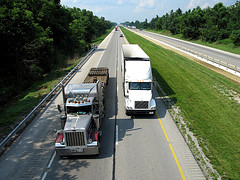Find Your Car's Most Fuel Economic Speed
As a former long-haul trucker, Jason knows a fair amount about saving money vs saving time when it comes to deciding how heavy to put your foot on the pedal. And it all come down to this: ” “Speed destroys your fuel economy,” he writes. “I routinely drove 3,000 plus miles per *week. The faster you go, the more gas you burn.” Here’s some quick math to back up his claim
Driving at 70mph =under 6 mpg
Driving at 60mph =around 7 mpg
Driving at 57mph = 7.5-8.1 mpg
By no means does he recommend people drive 57, but you need to figure out what speeds your car is best suited for. For one, slower is not necessarily always better. “When I was in training the engine/tranny was a DD60 with a 13 speed Eaton Fuller transmission,” he writes. “and that was the happiest at 67mph fuel economy would go down a fair amount if you were going 65.”
So figure out the speed your engine and transmission is happiest at and use that to get the best bang in your fuel tank for your buck at the fuel pump. One way to do this is to just Google for your car’s make and model and “most economical speed” and see what others before you have found out.
The other way is to drive at one speed and calculate your MPG and then try a different speed and compare the fuel efficiency you got. Here is a formula for calculating MPG:
1. Fill up with gas
2. Record the mileage
3. Drive on the highway at your test speed until the tank is less than half full
4. Fill up the tank (ideally at the same pump as before)
5. Record the mileage
6. Subtract the first mileage from the second mileage
7. Divide that result by the number of gallons it took to fill up your car that second time. That’s your MPG.
8. Repeat the process using the second speed you want to test and compare the results.
Oh, and as a former trucker, Jason has another tip for drivers: “Stay right and don’t be so twitchy when we are passing you, we know how to drive :)”
Want more consumer news? Visit our parent organization, Consumer Reports, for the latest on scams, recalls, and other consumer issues.


